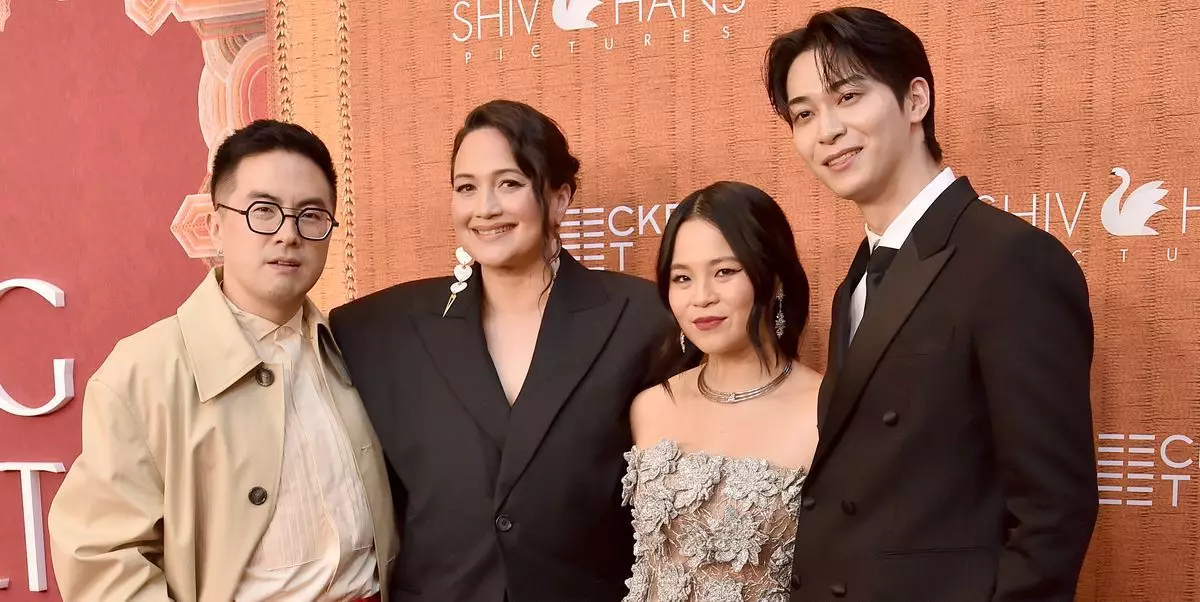Andrew Ahn’s latest film, “The Wedding Banquet,” is a vibrant homage to the groundbreaking 1993 classic directed by Ang Lee. Ahn’s retelling stands out not just for its rich cultural nuances but also for its invigorating reinterpretation of love and identity within the context of modern familial expectations. Set against the backdrop of Seattle’s eclectic tapestry, Ahn crafts a narrative that encapsulates contemporary queer experiences, striking a chord with audiences navigating similar personal dilemmas.
At the heart of the film lies Min, played by Han Gi-chan, a Korean heir whose deep-seated fears about acceptance and identity drive him into a precarious arrangement with Angela, portrayed by Kelly Marie Tran. The proposition of a green card marriage blossoms into something unexpectedly profound—setting off a chain of events that intertwines the characters’ lives in ways they never anticipated. This isn’t merely a story about a marriage of convenience; it serves instead as a catalyst for self-discovery amidst the chaotic yet earnest emotional landscapes of its characters.
The Complexity of Relationships
Relationships in “The Wedding Banquet” extend beyond romantic entanglements, exploring the intricate webs of friendship, familial duty, and cultural heritage. Angela—who agrees to the marriage under the stipulation that Min funds her partner Lee’s IVF treatments—navigates her own challenges of love and acceptance. Together, Angela and Min traverse a maze of cultural expectations imposed by Min’s traditional grandmother, played by the legendary Youn Yuh-jung, whose insistence on a grand wedding underscores the pressure that ethnic traditions can place on individuals.
The nuanced performances of the cast highlight the emotional depth required to portray such complex relationships. Bowen Yang’s contribution provides comic relief but also a grounding force that reminds viewers of the realities faced by those who often have to balance personal truths with societal demands. It’s a clever interplay of humor and gravity, allowing the audience to relate to the vulnerabilities and triumphs of the characters without losing sight of the overarching themes of love and acceptance.
A Transformative Experience for the Cast
The filming process itself has proven to be a transformative experience for the actors involved, particularly for Kelly Marie Tran, who publicly came out as queer while working on the film. This is not just a performance for Tran, but an exploration of her own identity wrapped in a narrative that celebrates LGBTQ+ experiences. The catharsis of embodying a character who navigates similar waters allowed her to confront her truths through the medium of art, creating a dialogue on acceptance that resonates beyond the screen.
Lily Gladstone, who plays Lee, reflects the sentiment that this film grants actors the freedom to express themselves in their most authentic forms. In a world where serious roles often overshadow the comedic, Gladstone revels in the opportunity to showcase a more whimsical side. Her character serves as the ‘straight woman’ in a world filled with chaos, but the humor she brings to the role emphasizes the film’s emphasis on resilience within the framework of absurdity that communal life often presents.
Cinematic Legacy and Cultural Significance
Writer James Schamus, who co-wrote the original “Wedding Banquet”, remains involved in the project, breathing life into Ahn’s vision while preserving the essence of its predecessor. The blend of nostalgia with fresh perspectives sparks a discourse about legacy and the evolution of storytelling. While one could argue that remaking a classic may tread on dangerous ground, Ahn’s work does not compromise; instead, it enriches the conversation around identity and belonging, making it a significant contribution to the annals of queer cinema.
Ultimately, “The Wedding Banquet” stands as a beacon of hope and authenticity in today’s polarized society. It speaks not just to the queer community but to anyone who has ever grappled with their identity against the expectations of those they love. The film shines a light on the beauty inherent in both biological and chosen families and encourages viewers to cherish connections that transcend traditional boundaries.
With its theatrical release leading the way to its availability on streaming platforms, audiences eagerly await to share in this banquet of laughter, love, and heartfelt revelations. There is an inclusivity here, a celebration of every unique flavor of love, served up with warmth and sophistication. Indeed, there’s no invitation required to partake in the joy that is bound to emerge from this reimagined feast of storytelling.

